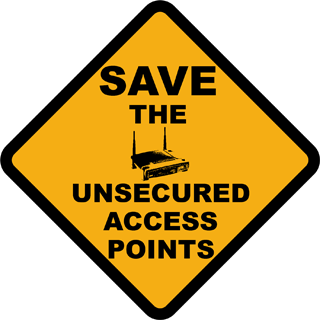
Protect the Wi-Fi wilderness!
Publication date: 1 April 2008Originally published 2007 in Atomic: Maximum Power Computing
Last modified 03-Dec-2011.
An endangered species is struggling for its life in suburbia today.
It's still not hard to find if you're patient, even in the most congested cities. But the encroachment of selfish humans threatens to snuff it out altogether. Without careful conservation measures, it will soon become extinct.
I speak, of course, of the unsecured wireless access point.
Whether of the common "Netgear" or "DLINK" type, or a more exotic strain, perhaps even with its own SSID, unsecured APs are a precious natural resource.
Like our forests and fisheries, unsecured APs are vulnerable to thoughtless exploitation. It only takes a couple of hours of porn downloading to completely exhaust the bandwidth allowance of many "unlimited" Internet accounts.
Since the kind of user who leaves their AP unsecured is probably also the kind of user who signs up with one of those ISPs that advertise during late-night reality TV, the "excess data" fee once you run off the end of the standard bandwidth allowance is probably $130 a gigabyte.
And when the bill comes, that poor little access point will probably be torn bodily from the wall and thrown out a window.
Many ISPs are also surprisingly intolerant of business use of open APs. Why, you often won't be able to send even three million 100%-legitimate double-opt-in invitations to purchase extremely-good-value replica wristwatches before the ISP pulls the plug.
But there are other, subtler threats.
The mainstream media, for instance, are trampling the fragile electronic environment. They're starting to actually tell people about wireless network security.
It didn't used to be this way. The papers and TV used to just run stories about how wireless networking was a key terrorist technology. Or they sensibly warned their readers - strangely only during the ratings season - about the well-established links between wireless network "electrosmog" and, what's it meant to cause this week, autism or something?
And, to their credit, some TV networks are still doing the right thing. They're making traditional computer shows - the kind that have the word "Cyber" in the title, and have presenters who put comforting air quotes around scary words like "Skype" and "Wi-Fi".
That's the kind of responsible reporting which we in the electronic environmentalist movement firmly support.
But other TV and newspaper pieces, even if they do still warn you that the word "router" is only for use by "boffins", have in recent months disturbingly gone on to explain about wireless network security.
And not just by telling you to turn off SSID broadcast and unplug your AP when you go to bed. Oh, no. Some of them even explain about more than one kind of WPA!
And millions of open APs cried out in terror - and were suddenly silenced.
You might think this isn't a problem, just because you can still find dozens of unsecured networks if you walk through any capital city with a Nintendo DS. Or perhaps you still don't even have to use a piece of Chinese cookware to connect to three of your neighbours' APs.
But with each passing month, those free, untamed, beautiful networks become fewer. Like the Tasmanian tiger, the unpassworded corporate dial-up line and the free SMS gateway, they may soon die out altogether.
But it's not too late!
When you next notice that the power plug of your DSL adapter has fallen out but you've still got Internet access, and then discover that your computer's helpfully connected you to next door's open AP which has a default name (and an unpassworded router at 192.168.0.1), nurture and cherish this frail little creature.
Download only what you really need.
Send only the Viagra spam that absolutely cannot wait.
And no matter how much ink cartridges cost these days, don't send your photos to your neighbours' network printer and then break into their house to collect them.
And whatever you do, don't change the open AP's SSID to "Please secure this access point!"
This critically endangered species depends for its survival on all of us.


